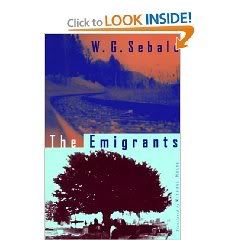I've written two poems about the Holocaust. I feel odd about that. I'm not Jewish for one thing. Also, Adorno's dictate remains in the back of mind: "writing poetry after Auschwitz is barbaric." I suppose he meant any poetry, but I'm sure he and many others would look especially askance at the presumption and gaucheness of writing Holocaust-themed poems. The ultimate act of literary bad taste.
In my poems, I tried to follow W.G. Sebald's example -- an oblique, indirect approach. Poems about how time and being themselves have been injured. Certainly not about envisioning in words the actual conditions of horror and despair. To me, that's dubious curiosity at best, a sublimating voyeurism at worst.
The notion of voyeurism grows out of an opinion I've held for quite some time: cruelty and murder have, in many or most cases, a perverse psycho-sexual component. I conjecture that the murderers at Babi Yar and elsewhere were erotically stimulated while slaughtering those helpless human beings.
Nazis are the most perverse people I can conceive of. Hitler and his SS were nothing but cheap sadists strutting under the colors of nation and race purity. I feel unclean even thinking about those uniformed perverts.
Even the writing of poems, stories, or novels about the experiences of victims and executioners strikes me as a form of voyeurism, a morbid fascination with lecherous homicide. Trying to envision in words those events of horror and hopeless death, trying to invent characters and their affective states...well...just don't do it. Or if you must -- if you can't control your metaphysical or literary libido, at least don't be gauche enough to seek publication of such a thing.
The existential aspects of those sufferers or perpetrators during the Holocaust do not admit of fictional participation. The products of such imaginings will be beyond the pale of worth or interest. The words will be lifeless things. Those years of horror do not admit of such pedestrian treatment. And pretentious "literary fiction" these days is certainly an absurd place in which to cast those events. Just don't do it.
But if you must write about the Holocaust, this is how it can be done with sensitivity and literary value:




I wrote a long comment and *poof* it vanished..To briefly recap I stated that through lengthy discussions with my brother who converted to Judaism many years ago I learned more than I care to remember about this horror against humanity. If (per your review) someone wrote on this beast with grace & insight it must be a worthy read.
ReplyDeleteI have a link ( I shall locate and link back)to a wonderful Indie film about a husband & wife that survived this nightmare.. Truly a beautiful film despite the horrors of it's origins.
Yes, W.G. Sebald wrote with much grace. The unimaginable horror lies quietly between his lines. An unspoken subtext.
ReplyDeleteAs opposed to some other writers who, because their literary imaginations are stimulated, think they are entitled to re-envision those events of horror and despair in their fiction. To me, that is a coarse, egoistic indulgence.